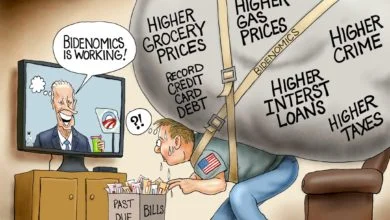Stasis politics, not voters, is driving elections
When Donald Trump, after several election cycles of toying with the idea, announced he was actually running for president, the conventional political pundit class snickered openly. A bombastic businessman whose controversial and often outlandish opinions, conventional wisdom dictated that he had absolutely no chance of gaining support.
When that bit of prognostication turned out to be totally fallacious, the pundit class began to begrudgingly accept Trump as a front-runner after poll after poll showed him far in the lead.
Polling, a shaky science at best, however, is almost totally meaningless, almost dangerous, in primaries. The most talked about polls, and therefore those that are most likely to influence voter perception of electability, are national. This is a problem because America does not have a national primary. Further, polls are wildly over-extrapolated. In reality, though the swings between the leader in polls and the closest competitors are talked about as absolute entities existing nationally, this number is only applicable to respondents of the poll, within a narrower range dictated by the margin of error and only at 97% or less of the time depending upon the confidence level (which the media never mentions).
Yet, imprecise and incorrectly interpreted mathematics like this influence media coverage and debate standing, as does backing from big-money donors and super-PACs. Again, the conventional political wisdom that rich bundlers drive elections is not really supported by facts. Within the last two quarters, Ted Cruz and Ben Carson– two candidates who do not have the backing of either GOP party fundraising organs or the party’s spin doctors- have had the biggest gains in hard money, the vast majority of which comes from small, one-time donations, which has baffled many of the pundit class.
The problem is stasis politics. Punctuated equilibrium, a widely accepted political theory, notes that dialogue and action that deals with public policy and elections is governed by long periods of stability and incremental change, punctuated at times by brief bursts of rapid, dynamic change.
This view, however, assumes complacency. It promotes the idea of a political “norm,” and any deviation from this is an aberration. Hence the idea that grassroots movements are not electable; they are too polarizing and venial because they are motivated by anger which, though potent, is fleeting. It is why the Tea Party waves of 2010 and 2014 were so shocking to pundits. The very real grievances of the base which drove the waves did not fit their model of stasis, so they were discounted.
Two serious problems to this view of thinking emerge. First, there is no such thing as stasis in politics. There might be wide-spread political consensus about a majority of significant issues, but these exist only because individual political actors happen to agree. The makeup of the majority, regardless of what identifying factors are used as a metric, depends entirely on each and every part that makes it up. Change one individual and the majority changes. Thus, there really is no such thing as deviation in politics, assuming honest ideological actors. There is only natural growth and change.
Tangential to this is the issue of how the polity is viewed. Most analysts take a holistic view, seeing politics in toto from a macro level, either federal or state depending upon the election. But this promotes the collective polis over the individual actors, which has the effect of dismissing those who threaten to deviate from the “norm” as inconsequential. It’s a form of analytical collectivism, where the dissenting few can be, and should be, ignored for the sake of the whole.
Rather, political analysis should be teleological, meaning it starts from the bottom, examining each individual actor, and works upwards and outwards in terms of community scale and influence. Anything else is ultimately hollow because it confuses the cause of political structure with its effects. And when these effects drive electoral races, discounting voter rationales and instead looking to trends like polls, it is not individual actors who drive elections, but elections who drive actors.




